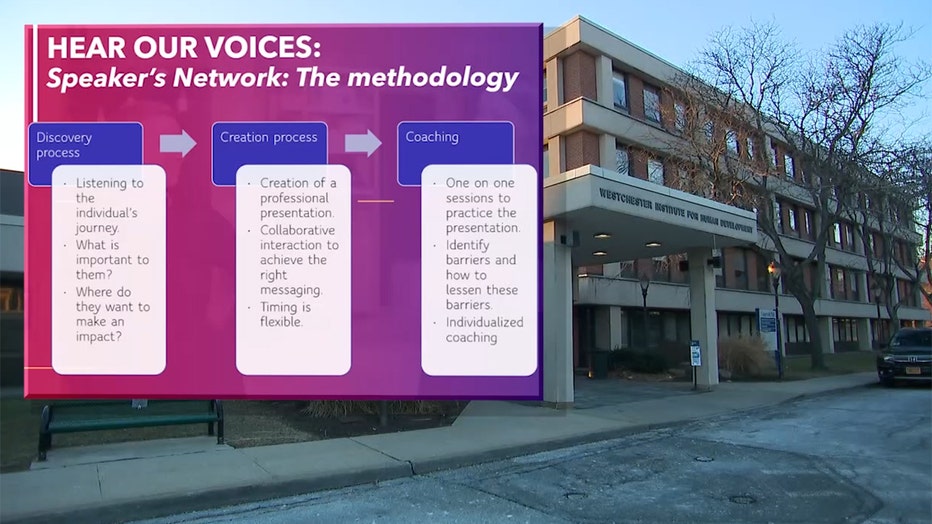Young adults with special needs learn to advocate for themselves

Course for self-advocating
Who better to educate others about what adults with disabilities need than those who need it most?
NEW YORK - Hannah Badain loves playing with her Labradoodle Sasha. The 33-year-old even created a social media profile for the dog to document their adventures together. Badain lives independently and has a job running a social recreational program for young adults with developmental disabilities, like herself.
Badain, who has autism, is able to live this way today only after years of advocating for herself to get the benefits she's entitled to from New York state.
"I would encourage young adults, as much as they're able to, and trust them to advocate for themselves," Badain said. "A lot of times, families jump in and decide what they think is best for their loved one but I think it's a lot more empowering to the extent that someone is able to be involved in the decision-making along the way."
Badain is part of Hear Our Voices, a self-advocacy group for the Westchester Institute for Human Development. Her mentor and coach Mariela Adams works there and helped develop a speakers network program. It teaches young adults with special needs how to advocate for themselves. Students pick an area of interest, and then Adams teaches the "self-advocates" how to make and give a PowerPoint presentation on the subject.
"When it comes from them, it's really meaningful — people connect to it," Adams said.
Get breaking news alerts in the free FOX5NY News app | Sign up for FOX 5 email newsletters
Her students learn to communicate — whether it's speaking in front of college students, telling lawmakers to change policy, or educating future doctors about patient care for people with special needs.
"When they tell stories about what it's been like to be a patient in medical settings and what's happened to them, medical doctors really listen to them," Adams said.
Claire Polin was 2 years old when she was diagnosed with cerebral palsy. Now 26, Polin took the self-advocacy course. Her presentation is aimed at improving the medical field.
"Give a patient time — so they might be scared or they might be sick enough where they can't communicate but give them time," Polin said. "Let them get involved in their care as much as possible."
Jesse Millman, 27, is on the autism spectrum. He is pursuing a bachelor's degree in finance at Iona College as well as working part-time as an investment assistant. He also enjoys teaching exercise classes. Like many people, he used to hate going to the dentist.
"I was deathly afraid to go to any dentist," Millman said.
His presentation was for aspiring dentists.
"It's important for the dentist to use the key factors — ask questions, caring, patience," Millman said. "That way the dentist will have a really good relationship with the patient with disabilities."
Brendan Klein helps teach the self-advocacy course. He helps students overcome the fear of public speaking.
"I want people to be able to hear their voices and be able to show that they don't have to be afraid, don't have to be nervous," Klein said. "I can teach them how to do that."
Klein has an intellectual disability. A few years ago, he recognized the importance of creating a social life for people with special needs, who often can be isolated. He created Tic Tac Go, a Facebook page to help people with disabilities make new connections. He arranges social events like bowling, movies, and concerts. It was so popular that he formed another group that helps young adults with special needs get together for volunteer projects.
"I think there's a lot of misunderstanding of people understanding what people with disabilities really need," Klein said.
Learning to self-advocate is an important skill for anyone to master but it's especially valuable for people with special needs. Who better to educate others about what they need than those who need it most?
Polin put it this way, self-advocating again, this time for friendship.
"Don't be afraid of who you are or of who anybody else is," Polin said. "Get to know someone with a disability — you never know, they might be your best friend."


